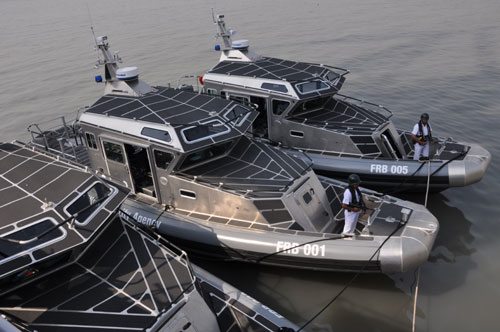A bomb ripped through a Pakistani bus in Karachi on Thursday, killing four naval personnel and a passing motorcyclist in the third attack on navy transport this week in the country’s biggest city.
A dozen people were wounded in the attack claimed by the Taliban in Pakistan’s politically tense economic capital and southern port, where NATO ships supplies to the 130,000 US-led troops fighting in Afghanistan.
Two other navy buses were bombed on Tuesday, dealing a blow to the military just days after Pakistan’s army chief General Ashfaq Kayani claimed his forces had “broken the back” of Taliban and Al-Qaeda-linked militants.
“Now a total of four of our employees — all sailors — have been martyred in the attack on our bus, while seven others are injured,” spokesman Commander Salman Ali told AFP. Four other navy personnel died on Tuesday.
The navy said the bomb was planted in a manhole. The explosives tore through sign boards, a fuel station and parked cars, and rescue workers were afterwards seen covering bodies with white sheets.
Five navy personnel and seven other people were also wounded, said provincial government official Sharfuddin Memon.
Passer-by Asghar Ali, being treated for injuries in hospital, said: “I was trying to cross the road a few feet away from the bus when I heard an explosion and saw the bus was hit and people inside and around crying.”
The bomb exploded close to the scene of Pakistan’s deadliest attack, which killed 139 people at the 2007 homecoming of the former prime minister Benazir Bhutto, who was subsequently killed in a separate bombing two months later.
Prime Minister Yousuf Raza Gilani condemned the attack and called for an immediate investigation “so that further course of action can be taken”.
Provincial chief minister Qaim Ali Shah said the blast appeared to be the work of the same group that was behind Tuesday’s bombings, which wounded nearly 60 people and were the worst attacks on military officials in Karachi in years.
Shah said that authorities had tried to change the navy’s routes after Tuesday’s blasts but refused to point the finger of blame at any particular organisation.
Ehsanullah Ehsan, a spokesman for Pakistan’s main Taliban faction, claimed responsibility for all the attacks on navy buses in Karachi.
“Whether it is the navy, army or air force, they are all our enemies. We want to make it clear to the military to prepare for similar attacks in the future,” he told AFP by telephone from an undisclosed location.
Authorities on Tuesday had blamed extremist Islamist groups linked to the Taliban and Al-Qaeda, such as Lashkar-i-Jhangvi, which was involved in the Karachi kidnap and beheading of US journalist Daniel Pearl in 2002.
Analysts said the navy was a soft target and that attacks in Karachi, where government security officials had previously been relatively immune from bombings further north, scored propaganda hits for the militants.
“It is utter intelligence failure,” said defence analyst Talat Masood.
Home to Pakistan’s stock exchange and a lifeline for a depressed economy wilting under inflation and stagnating foreign investment, until this week there had been no attacks on the military in Karachi for years.
Most of the Islamist bombings dogging Pakistan, in which more than 4,240 people have died in four years, have been concentrated further north.
“By attacking the forces in Karachi, the militants prove their point that they can strike anywhere in Pakistan,” said Masood.
“In Karachi it is easier for them to attack less secured buses and installations of the navy, a force which has least security available.
“It is much harder for authorities to prevent such attacks in the sprawling and most disorganised city of the country,” he said.
The United States considers Pakistan’s northwestern border areas with Afghanistan the global headquarters of Al-Qaeda.
On the border Wednesday, Pakistan said one of its soldiers was killed and three wounded by “unprovoked firing” from Afghan troops, and that shops were also damaged and civilian casualties caused at a market in South Waziristan.
Mokhles Afghan, spokesman for the local government in Afghanistan’s border province of Paktika, told AFP he had reports that two border police officers and seven civilians were wounded in the exchange of fire.










